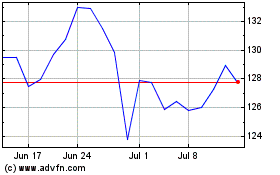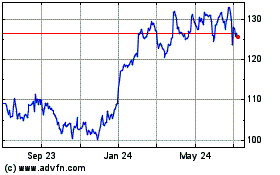Eli Lilly's Late Stage Alzheimer's Trial Fails To Achieve Goal -- 2nd Update
November 23 2016 - 9:44AM
Dow Jones News
By Peter Loftus
An experimental Eli Lilly & Co. drug failed to significantly
help Alzheimer's disease patients in a closely watched clinical
trial, dealing another blow to the pharmaceutical industry's long
quest to find a better treatment for the condition.
The disappointing outcome also may revive doubts about an entire
branch of Alzheimer's research that has dominated the industry's
efforts in the past decade. Lilly and other companies have
developed drugs that try to stop the buildup of a sticky protein in
the brain known as beta amyloid -- believed by many to be the
primary culprit in the disease. But none of these drugs has worked
in a major patient study, and Lilly's failure could spur efforts to
pursue alternative drug targets.
The news sent Lilly shares tumbling more than 14% in premarket
trading Wednesday. Shares of Biogen Inc. and Merck & Co., which
also are developing anti-amyloid drugs, dropped 8.2% and 2.8%,
respectively.
The latest share-price declines worsen an already tough year for
drug stocks, as companies contend with a backlash against rising
prescription prices and other challenges. The NYSE Arca
Pharmaceutical Index is down 13% year-to-date and the Nasdaq
Biotechnology index is down 17%, while broader market indexes are
up for the year.
Current treatments for the fatal disease can alleviate symptoms
but don't slow the condition's underlying progression. The
dementia-causing brain disorder afflicts an estimated five million
Americans, but has been a tough disease for the drug industry to
crack because scientists don't fully understand what causes it.
Companies including Pfizer Inc. and Johnson & Johnson have
scrapped many experimental drugs that initially looked promising
but failed to significantly slow deterioration of memory and other
cognitive and daily-living skills of Alzheimer's patients in
clinical trials.
Despite the setbacks, the industry has continued to hunt for
better treatments because of the limitations of current options.
And a huge market opportunity awaits drugs that can slow or halt
disease progression rather than temporarily alleviate symptoms.
J.P. Morgan estimates annual sales of such drugs, if they
eventually reach the market, could top $20 billion.
Lilly said in a press release Wednesday it wouldn't apply for
regulatory approval to market its experimental Alzheimer's drug,
solanezumab, for the treatment of mild dementia due to Alzheimer's
disease. The company said the drug failed to significantly slow
cognitive decline in patients with mild disease compared with a
placebo in the "Expedition 3" study.
"The treatment effect still proved to be not sufficient to
result in a significant slowing of cognitive decline," Leerink
Partners analyst Seamus Fernandez wrote in a research note.
The study was a risky and costly bet for Lilly because two prior
studies of solanezumab, the results of which were reported in 2012,
also had mostly negative results. But Lilly scientists had seen a
ray of hope because the drug appeared to slow cognitive decline in
a subgroup: patients with a mild form of the disease. Patients with
mild symptoms may have some memory loss but haven't fully lost the
ability to perform daily functions like getting dressed.
Lilly started the newer study in 2013, enrolling about 2,130
patients with mild Alzheimer's symptoms and signs of amyloid plaque
in the brain as determined by imaging scans or spinal-fluid tests.
About half of the patients received solanezumab, infused
intravenously once every four weeks, and the other half got a
placebo.
The main goal of the study was to test whether solanezumab
slowed the decline in cognition versus a placebo. One of the
secondary goals was to test whether the drug slowed decline in
function versus placebo. Patients were analyzed after 18 months of
treatment. Lilly said Wednesday the study results "directionally"
favored solanezumab on secondary goals, but the magnitude of the
benefit was small.
Lilly hasn't disclosed total costs of developing the drug, but
Eric Siemers, a lead Lilly Alzheimer's researcher, said in a recent
interview it has been in the hundreds of millions of dollars.
Lilly said Wednesday it would record a fourth-quarter charge of
about $150 million, or 9 cents a share, in connection with the
study failure.
The trial's results "were not what we had hoped for and we are
disappointed for the millions of people waiting for a potential
disease-modifying treatment for Alzheimer's disease," Chief
Executive John Lechleiter said.
--Austen Hufford contributed to this article.
Write to Peter Loftus at peter.loftus@wsj.com
(END) Dow Jones Newswires
November 23, 2016 09:29 ET (14:29 GMT)
Copyright (c) 2016 Dow Jones & Company, Inc.
Merck (NYSE:MRK)
Historical Stock Chart
From Mar 2024 to Apr 2024

Merck (NYSE:MRK)
Historical Stock Chart
From Apr 2023 to Apr 2024
